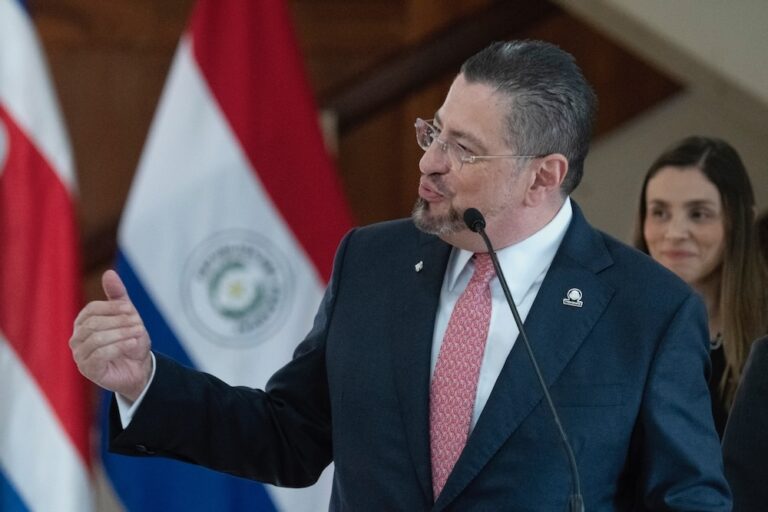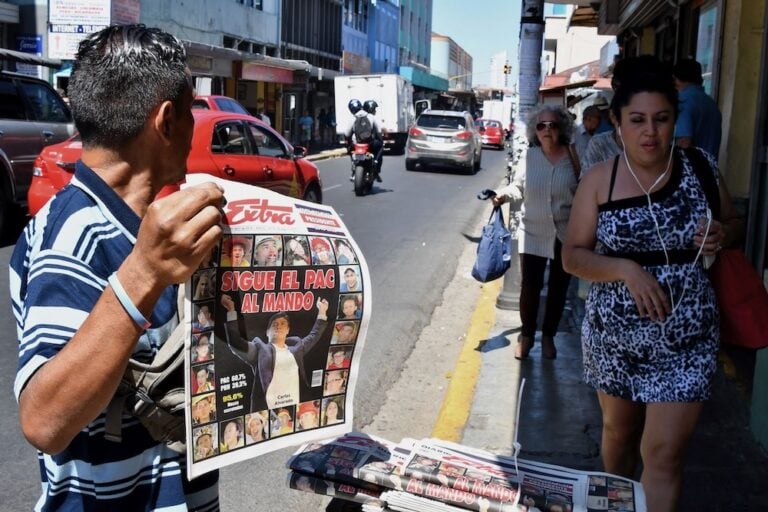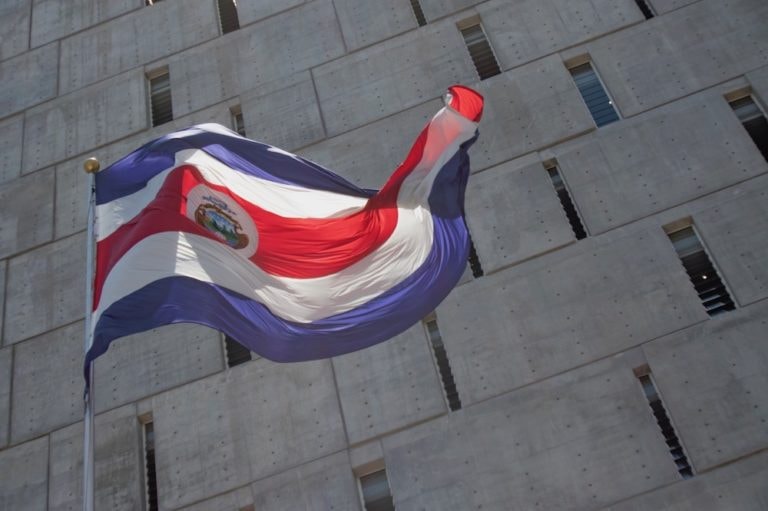(WPFC/IFEX) – The following is a 27 April 2004 WPFC press release: Washington, April 27, 2004 – The World Press Freedom Committee (www.wpfc.org), an umbrella organization representing 45 press freedom groups in six continents, has submitted an amicus curiae brief to the Inter-American Court of Human Rights on behalf of Costa Rican journalist Mauricio Herrera, […]
(WPFC/IFEX) – The following is a 27 April 2004 WPFC press release:
Washington, April 27, 2004 – The World Press Freedom Committee (www.wpfc.org), an umbrella organization representing 45 press freedom groups in six continents, has submitted an amicus curiae brief to the Inter-American Court of Human Rights on behalf of Costa Rican journalist Mauricio Herrera, who is fighting a criminal defamation sentence.
After almost 10 years of legal battles, Herrera – a reporter for the San José daily La Nación – and his lawyers will finally have their day in court to present their case before the highest inter-American tribunal. The court’s decisions are binding for the 21 countries that recognize its authority, including Costa Rica.
This case could have historical consequences in the region, and should the magistrates rule in the defendant’s favor, they would most likely declare criminal defamation laws – the same ones used to indict Herrera – incompatible with the American Convention on Human Rights. The signatory countries would then be obligated to decriminalize those laws, one of the largest obstacles to transparency and accountability in Latin America.
The WPFC’s amicus brief was written by the organization’s General Counsel, Kevin Goldberg, and was sent via fax and electronic mail to the magistrates of the court, which sits in San José.
The odyssey of Herrera and La Nación began in 1995 after the reporter wrote a series of articles about Costa Rican diplomat Félix Przedborski and his alleged activities related to illegal traffic of weapons, drugs, cigarettes and foreign currency in Europe. Herrera based his articles on European press reports, especially from Belgian publications.
In December of that year, Przedborski filed a civil suit for defamation against Herrera and he filed another suit in criminal court for calumny and defamation a month later.
In 1998, the San Jose First Circuit Criminal Tribunal, Third Chamber, acquitted Herrera of the criminal violation of Articles 146 and 152. Przedborski appealed the sentence to the Supreme Court’s Third Chamber, which reinstated the case. The case was returned to the San Jose First Circuit Criminal Tribunal, which – by a panel consisting of different judges than those which first heard the case – found that Herrera was guilty of Articles 146 and 152 and forced him to pay punitive damages for inflicting emotional distress. Also, the state imposed a fine against Herrera in the amount of 300,000 colones (approximately $700 US); alternatively, he could spend 120 days in prison.
In addition, La Nación was sentenced to pay Przedborski’s legal fees and have its name listed in the Judicial Registry of Criminals. It was also ordered to eliminate the links on its Internet web site which connected to the original articles published about the plaintiff, and instead La Nación was ordered to create a link to the court’s ruling. The Third Chamber of the Supreme Court upheld this sentence in 2001.
Herrera then submitted his case to the Inter-American Commission on Human Rights (IACHR) on March 1, 2001. The Commission ruled in his favor on October 10, 2002, concluding that the sanctions violated Herrera’s right to freedom of expression. When the Costa Rican government failed to follow the commission’s recommendation that it revoke the judgment and order for injunctive relief, pay compensation to Herrera and reform its laws to prevent further infringements of this sort on free expression, the commission filed the case with the Inter-American Court of Human Rights.
“The case of Mauricio Herrera and La Nación newspaper deals with the fundamental principle that no journalist should risk going to prison for the mere act of doing his or her job,” said WPFC Executive Director Mark Bench. “Mr. Herrera’s articles appeared to be well researched and balanced, and they even included positive references to Mr. Przedborski. But in a show of arbitrary, unfair and unjust judicial process, the Costa Rican courts applied a gag on press freedom which now must be removed by the Inter-American court.”
The WPFC amicus underlines that the repressive nature of both criminal defamation laws and insult laws constitutes a judicial Damocles sword hanging over the practice of free journalism in almost every Western Hemisphere country.
The WPFC amicus argues: “Because they carry the threat of imprisonment and/or fines, laws creating criminal penalties for defamatory statements and insult laws have a chilling effect which interferes with the right of the press to impart valuable information, as well as the public’s right, and need, to receive that information.”
WPFC insists these cases should be dealt with in civil courts, not in criminal ones, as the IACHR has repeatedly opined.
“Statutes which punish defamatory speech exist to address the harm that actionable false statements may cause to a personal reputation. That harm cannot be compensated through the use of penal sanctions. Civil lawsuits exist for this reason. Criminal defamation statutes and insult laws only seek to protect a State or political interest, which cannot and should not be protected by restricting or penalizing expression,” reads the brief.
Furthermore, the amicus indicates laws like those applied against Herrera are incompatible with democratic governments.
The amicus further states: “Criminal penalties for defamation are rarely imposed and insult laws are rarely enforced in the established democracies of Western Europe and North America. In countries in which enforcement is more frequent, these laws are enforced on an inconsistent basis which reveals their status as political tools of authoritarianism.”
Once the hearing is held on April 30, the Inter-American court will start its deliberations and is expected to hand down its decision before June 30.


